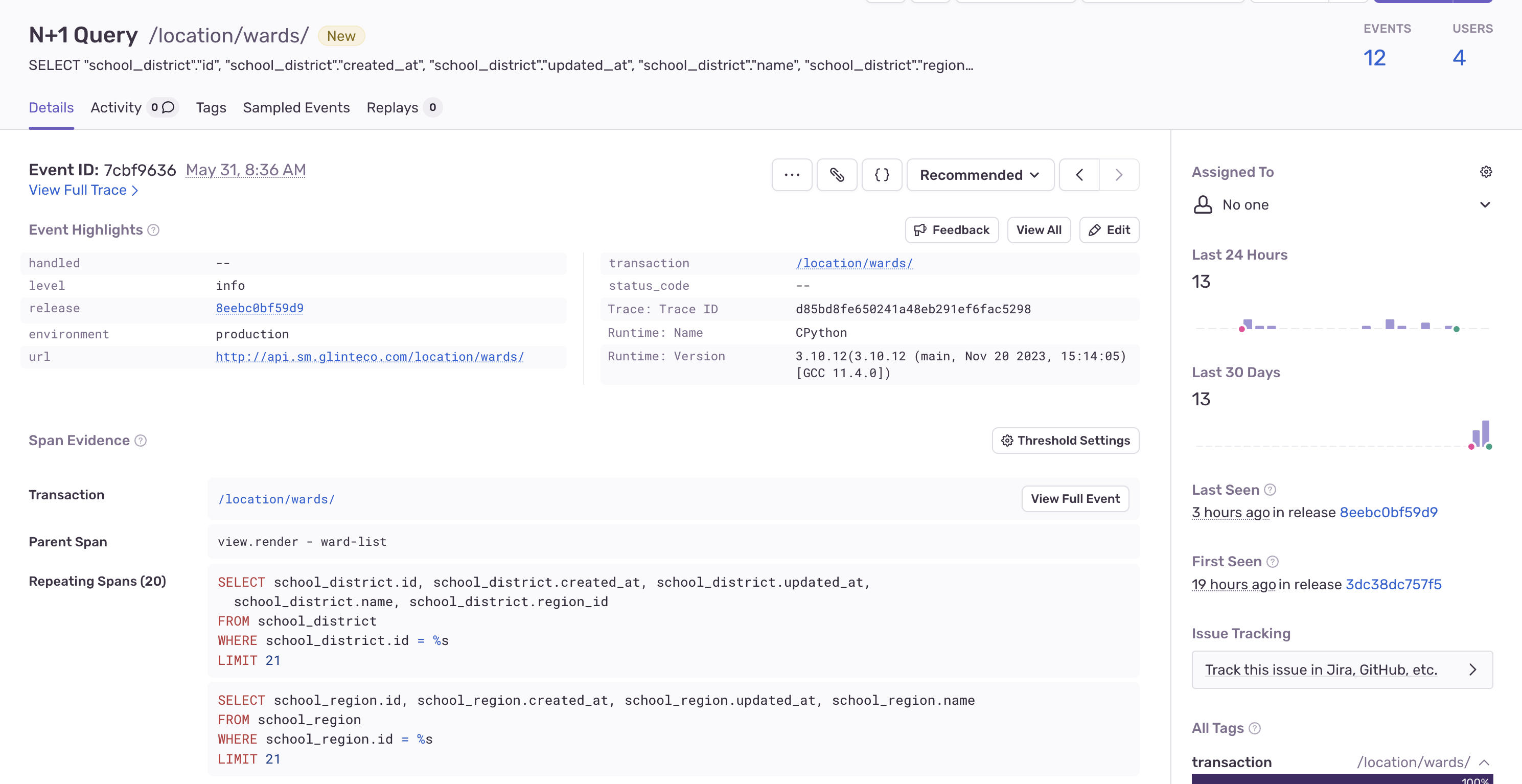[One Package Per Day] Django Query Inspector
By JoeVu, at: Nov. 2, 2023, 6:03 p.m.
Estimated Reading Time: __READING_TIME__ minutes
![[One Package Per Day] Django Query Inspector](/media/filer_public_thumbnails/filer_public/20/1b/201bf0be-b4ee-4ab9-b81c-d14a1d3eea24/one_package_per_day_django_query_inspector.png__1500x900_crop_subsampling-2_upscale.png)
![[One Package Per Day] Django Query Inspector](/media/filer_public_thumbnails/filer_public/20/1b/201bf0be-b4ee-4ab9-b81c-d14a1d3eea24/one_package_per_day_django_query_inspector.png__400x240_crop_subsampling-2_upscale.png)
In "One Package Per Day" series, where we explore useful packages that can enhance your Django projects, and today, we're exploring Django Query Inspector—a powerful tool for monitoring and optimizing database queries in your Django application.
Installation
To install Django Query Inspector, simply use pip:
pip install django-query-inspector
After installation, add 'query_inspector' to your INSTALLED_APPS in your Django settings:
INSTALLED_APPS = [
# Other installed apps
'query_inspector',
]
Add the middleware to your MIDDLEWARE settings:
MIDDLEWARE = [
# Other middleware
'query_inspector.middleware.QueryInspectorMiddleware',
]
Getting Started
Once installed and configured, Django Query Inspector will start monitoring your database queries. You can access the query inspector via the Django admin interface or use the middleware to log query details for each request.
[SQL] repeated query (10x): SELECT "books"."id",
"books"."author_id", "books"."name"
FROM "books" WHERE "books"."author_id" = ?
Key Features
- Query Logging: Logs all SQL queries executed during a request.
- Duplicate Query Detection: Identifies and highlights duplicate queries.
- Slow Query Detection: Flags queries that take longer than a specified threshold.
- Detailed Query Reports: Provides detailed reports on query performance and statistics.
Pros and Cons
Pros
- Provides comprehensive insights into database query performance.
- Helps identify and eliminate inefficient queries.
- Easy to integrate with existing Django projects.
- Resolve the problem with N+1 queries issues in Django
Cons
- Can introduce overhead if logging a large number of queries.
- Should be used with caution in production environments to avoid performance impact.

Use Cases
- Performance Optimization: Identify slow and duplicate queries to optimize database performance.
- Debugging: Troubleshoot issues related to database queries.
- Monitoring: Keep track of query performance and detect potential bottlenecks.
Best Practices
- Use the query inspector primarily in development and staging environments.
- Regularly review query logs and reports to identify and fix inefficiencies.
- Set appropriate thresholds for slow query detection to balance performance monitoring and overhead.
Customization
Django Query Inspector allows for customization of its behavior through various settings.
For example, you can configure the slow query threshold and enable or disable specific features:
# Whether the Query Inspector should do anything (default: False)
QUERY_INSPECT_ENABLED = True
# Whether to log the stats via Django logging (default: True)
QUERY_INSPECT_LOG_STATS = True
# Whether to add stats headers (default: True)
QUERY_INSPECT_HEADER_STATS = True
# Whether to log duplicate queries (default: False)
QUERY_INSPECT_LOG_QUERIES = True
# Whether to log queries that are above an absolute limit (default: None - disabled)
QUERY_INSPECT_ABSOLUTE_LIMIT = 100 # in milliseconds
# Whether to log queries that are more than X standard deviations above the mean query time (default: None - disabled)
QUERY_INSPECT_STANDARD_DEVIATION_LIMIT = 2
# Whether to include tracebacks in the logs (default: False)
QUERY_INSPECT_LOG_TRACEBACKS = True
# Project root (a list of directories, see below - default empty)
QUERY_INSPECT_TRACEBACK_ROOTS = ['/path/to/my/django/project/']
# Minimum number of duplicates needed to log the query (default: 2)
QUERY_INSPECT_DUPLICATE_MIN = 1 # to force logging of all queries
# Whether to truncate SQL queries in logs to specified size, for readability purposes (default: None - full SQL query is included)
QUERY_INSPECT_SQL_LOG_LIMIT = 120 # limit to 120 chars
Integration
Django Query Inspector integrates seamlessly with the Django admin interface, providing an easy way to view query logs and reports. It can also be used alongside other performance monitoring tools.
Performance Considerations
While Django Query Inspector is a powerful tool for monitoring query performance, it can introduce some overhead. It's important to use it judiciously, especially in production environments, to avoid performance degradation.
Comparison with Similar Packages
Django Query Inspector vs. django-debug-toolbar:
- Django Query Inspector focuses specifically on database queries, providing more detailed insights and reports.
- django-debug-toolbar offers a broader range of debugging tools, including query monitoring.
Django Query Inspector vs. django-silk:
- django-silk provides comprehensive profiling and monitoring, including query inspection.
- Django Query Inspector is more focused on query performance and optimization.
Other Useful Packages from the Django Community
- Django Extensions: For additional management commands and tools.
- Django Debug Toolbar: For real-time debugging and performance profiling.
- django-silk: For detailed profiling and monitoring of Django applications.
Community and Documentation
Django Query Inspector has a supportive community and comprehensive documentation available at Django Query Inspector Documentation. The community is active on GitHub, providing support and contributions.
Conclusion
Django Query Inspector is an invaluable tool for any Django developer looking to optimize database performance. By providing detailed insights into query execution and performance, it helps you identify and fix inefficiencies in your application's database interactions.

![[One Package Per Day] - Django Notification](/media/filer_public_thumbnails/filer_public/9b/86/9b86b1fb-30ac-47d7-abff-4ca390464e65/django_notifications.png__400x240_q85_crop_subsampling-2_upscale.jpg)
![[One Day One Package] An Overview of Django Ninja](/media/filer_public_thumbnails/filer_public/cf/6f/cf6f4036-7f78-45c7-87bb-55901cc3b80f/django_ninja.png__400x240_q85_crop_subsampling-2_upscale.jpg)
![[One Package Per Day] Django Health Check](/media/filer_public_thumbnails/filer_public/ed/b0/edb0ba94-3698-46d3-950b-bdd9df3259be/django_health_check.png__400x240_q85_crop_subsampling-2_upscale.jpg)

